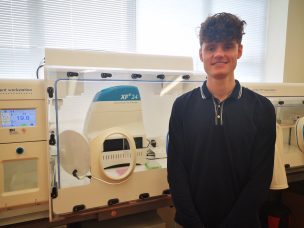Can synthetic miR-31 mimics/anti-miRs be employed as a novel therapeutic for enhancing chemotherapy and radiotherapy sensitivity of pancreatic cancer?

This year the successful Musgrave PhD Scholar, in association with Breakthrough is David Hackett. David, who is from Kildare will work with supervisor, Dr Stephen Maher in TCD on pancreatic cancer.
His research question is “Can synthetic miR-31 mimics/anti-miRs be employed as a novel therapeutic for enhancing chemotherapy and radiotherapy sensitivity of pancreatic cancer?”.
This proposal focuses on pancreatic cancer research, a poor prognosis cancer in Ireland and globally. Patients diagnosed with pancreatic adenocarcinoma (PDAC), which represents >90% of all pancreatic cancer cases, have an extremely poor prognosis; the vast majority of patients (~75%) will die within one year of diagnosis.
PDAC has now surpassed breast cancer to become the 3rd highest cause of cancer-related death and is projected to be the 2nd most common cause of cancer-related death in the US by 2030; a trend mirrored in Europe. Less than 10% of those diagnosed with pancreatic cancer will live for 5 years after their diagnosis.
As PDAC is typically poorly responsive to chemotherapy and radiotherapy, patients achieve only modest prolongation in overall survival with these conventional therapies, frequently at a cost of significant side effects and a negative impact on quality of life. As such there is a significant need to characterise mechanisms of resistance to chemotherapy and radiotherapy in PDAC, identify predictive biomarkers to guide choice of cytotoxic therapy and develop new therapeutic approaches.
The project will investigate a promising new RNA-based therapeutic strategy to improve the effectiveness of conventional chemotherapeutic and radiotherapy regimens. The ultimate aim is to increase survival through improved treatment efficacy.
Back








 Contact
Contact